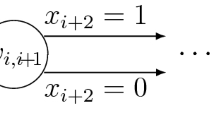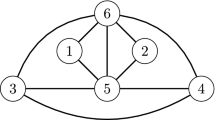Abstract
A new implicit enumeration algorithm for the solution of the 0–1 knapsack problem — denoted by FPK 79 — is proposed. The implementation of the associated FORTRAN IV subroutine is then described. Computational results prove the efficiency of this algorithm (practically linear time complexity including the initial arrangement of the data) whose performance is generally better than that of algorithm 37 and thus superior to that of the best known algorithms.
Zusammenfassung
Wir stellen einen neuen Enumerationsalgorithmus — FPK 79 genannt — für die Lösung des 0–1 Knapsack Problems vor. Dann beschreiben wir die zugehörige Fortran IV Subroutine. Die durchgeführten numerischen Versuche zeigen experimentell, daß der Algorithmus einschließlich des Sortierens der Eingangsdaten lineares Zeitverhalten aufweist. Er ist damit leistungsfähiger als der Algorithmus 37 und somit besser als die besten bekannten Algorithmen.
Similar content being viewed by others
References
Balas, E., Zemel, E.: An algorithm for large zero-one knapsack problems. Operations Research28, 1130–1154 (1980).
Fayard, D., Plateau, G.: Resolution of the 0–1 knapsack problem: comparison of methods. Mathematical Programming8, 272–307 (1975).
Fayard, D., Plateau, G.: Techniques de résolution du problème du knapsack en variables bivalentes: partie III. Publication 91, Laboratoire de Calcul, Université des Sciences et Techniques de Lille I, France (1977).
Fayard, D., Plateau, G.: Reduction algorithms for single and multiple constraints 0–1 linear programming problems. Proceedings of the Congress Methods of Mathematical Programming, Zakopane, Poland, 1977.
Fayard, D., Plateau, G.: On “an efficient algorithm for the 0–1 knapsack problem, by Robert M. Nauss”. Management Science24, 918–919 (1978).
Fayard, D., Plateau, G.: Contribution à la résolution des programmes mathématiques en nombres entiers, Thèse d'Etat, Université des Sciences et Techniques de Lille I France, 1979.
Greenberg, H., Hegerich, R. L.: A branch search algorithm for the knapsack problem. Management Science16, 327–332 (1970).
Lawler, E. L.: Fast approximation algorithms for knapsack problems. Mathematics of Operations Research4, 339–356 (1979).
Martello, S., Toth, P.: Algorithm for the solution of the 0–1 single knapsack. Computing21, 81–86 (1978).
Sedgewick, R.: Implementing Quicksort programs. Communications of ACM21, 847–857 (1978).
Walukiewicz, S.: The size reduction of a binary knapsack problem. Bulletin of the Polish Academy of Sciences, Series Sciences and Technics23 (1975).
Zoltners, A. A.: A direct descent binary knapsack problem. Journal of ACM25, 304–311 (1978).
Author information
Authors and Affiliations
Rights and permissions
About this article
Cite this article
Fayard, D., Plateau, G. An algorithm for the solution of the 0–1 knapsack problem. Computing 28, 269–287 (1982). https://doi.org/10.1007/BF02241754
Received:
Revised:
Issue Date:
DOI: https://doi.org/10.1007/BF02241754




